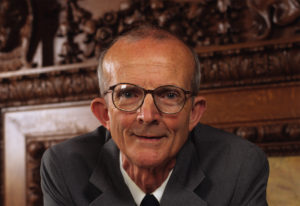
James W. Davis, professor emeritus of political science at Washington University in St. Louis, a role model for faculty and beloved by students for decades, died Wednesday, April 27, 2016, at Barnes-Jewish Hospital. He was 80.
Davis, a nationally recognized scholar of American politics and public policy, was a prolific writer of opinion commentaries for newspapers and other media and a frequently cited expert on U.S. military and foreign-policy issues.
His essays appeared in major news publications such as The New York Times, the Los Angeles Times and the Chicago Tribune. For a brief stint, he served as the editorial page editor of the St. Louis Globe-Democrat.
“Few people have served Washington University in as many important ways as Jim has,” Chancellor Mark S. Wrighton said. “Jim was a terrific professor in every respect and he served in several important administrative roles. He was one of the very first people I met as I was introduced to the community about 21 years ago, because he was vice-chair of the search committee that led to my appointment as chancellor. He became a great friend and counselor, and I will miss him greatly, as we all will.”
Chancellor Emeritus William H. Danforth described Davis as one of the university’s most most versatile, trusted, hard-working and effective citizens.
“Jim was a devoted teacher of students and alumni. He loved and respected his university and took on countless tasks to better it,” Danforth said. “Totally unselfish, he asked nothing for himself, but the excitement of a challenging new task.”
Davis was born and raised in Chillecothe, Mo. He earned his bachelor’s degree from Harvard College in 1957 before enlisting in the U.S. Army, serving with the Army Security Agency as a Russian linguist, stationed in Germany. After his discharge, he enrolled in the graduate program in political science at the University of Michigan, where he earned master’s and doctoral degrees in 1962 and 1964, respectively.
Davis was a Brookings Fellow in Washington, D.C., from 1963-64. He taught at the University of Wisconsin from 1964-68, before joining the political science department at Washington University.
His research and teaching focused on the U.S. presidency, political campaigns, military history, the politics of war, national defense, intelligence and security issues. He was the co-author and editor of several books, including “The National Executive Branch: An Introduction to Public Administration”; “Politics, Programs, and Budgets: A Reader in Government Budgeting”; and, with Kenneth M. Dolbeare, “Little Groups of Neighbors: The Selective Service System.”
Davis taught mostly in Arts & Sciences, but he also taught courses in business, engineering and social work.
His classes on the American presidency were popular with students, especially during election years when Washington University hosted one of the nation’s pivotal presidential or vice-presidential debates. In these international news events, Davis often played a key role, moderating political panel discussions and offering commentary for visiting news media.
Davis officially retired from the classroom in 2009, but he continued to be active at the university as an emeritus professor of political science and a tireless volunteer still willing to take on important leadership and advisory roles. Most recently, he served as the university’s vice chancellor for students and coordinator of special projects.
Previous administrative roles include serving as associate provost and associate dean of Arts & Sciences (1978-80); vice chancellor and associate provost (1980-81); and vice chancellor (1981-1986). He served as acting director of Edison Theatre and lead administrator for University College in 1980. He was acting dean for the School of Art from 1988-90.
He has been a member of many important university committees, including the Committee to Prepare for the 21st Century; the Advisory Committee on Tenure, Promotion and Personnel in Arts & Sciences; the Chancellor Search Committee; and the Undergraduate Council. He served as founding director of what was then known as the Gephardt Institute for Public Service, retiring from that position in 2006.
A champion of the pursuit of excellence in teaching, both for the student body and the faculty, Davis served as director of the Teaching Center from 1996-98. On two occasions, he received the Award for Teaching Excellence from the Arts & Sciences student council. He also received an Emerson Excellence in Teaching award.
“Jim was a veteran teacher and a great guy who served as a role model for many new faculty,” said longtime colleague William Lowry, professor of political science in Arts & Sciences. “He taught big courses with lots of students, and other faculty learned from him how to do that well. He cared deeply about his students, and they loved him in return. Everyone admired his dedication to teaching.”
Davis received the university’s Distinguished Faculty Award in 1997 and the Dean’s Medal in Arts & Sciences in 2002.
The university also honored Davis and his wife, Jean, in 2015 with establishment of the James W. and Jean L. Davis Professorship. The professorship is held by Fiona Marshall of the Department of Anthropology.
“I will miss my friend Jim Davis, model academic and gifted, devoted well-prepared teacher of students, alumni and donors,” Danforth said. “He loved and valued this university and worked hard to improve us. He repeatedly, ably and unselfishly took on countless tasks, including serving as vice-chair and organizer of the last search committee for a new chancellor. He and his wife, Jean, helped build the modern Washington University.”
Davis is survived by Jean, his wife of 54 years; a daughter, Clare Davis (David Obedin); a son, Warren (Emily) Davis, all of St. Louis; and three grandchildren.
A campus memorial service is planned for 4 p.m. Monday, June 6, in Graham Chapel.